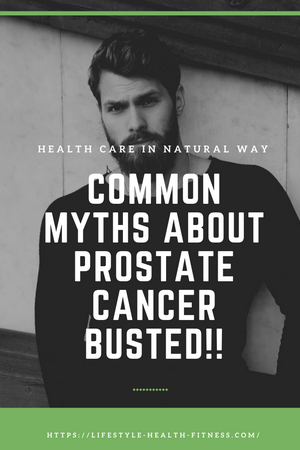Prostate cancer is one of the least talked about cancer in the world. Hence, there is a great deal of confusion regarding the same, and myths about prostate cancer are aplenty. With more and more money being spent on research, the treatment and screening options have changed. Thus, it is very important to stay updated.
Prostate Cancer – What is it?
The prostate is a tiny, walnut-shaped gland present in the pelvic region of men. Cancer in the prostate is quite common with around 11% rate of occurrence, which roughly translates to 1 in every 9 men. It is a cause of grave medical concern for men as it accounts for the 2nd highest number of cancer fatalities for men in the US.
6 Myths about prostate cancer you must know

Due to the stigma associated with this type of cancer, a lot of myths and hearsay has been doing the rounds. Hence, it becomes really important to bring out the truth. So, without further ado, below are the 6 most common myths about prostate cancer you must definitely know about:
It can only happen to old people
While major occurrence happens in males above 60 years of age, it is not necessarily an old man’s disease. Studies show that ~35% of cases happen to men of younger age.
Factors like race, geography, lifestyle, and genetics play a role as well, and hence, it is a myth to assume that prostate cancer can only happen to old men.
It is necessary to treat prostate cancer irrespective of its aggressiveness
The treatment plan for this cancer depends entirely on its aggressiveness. In a lot of cases, a man might not require any treatment for prostate cancer because of its slow nature.
However, the final word resides with the physician treating the patient.

Prostate Formula Pellets 120pellets
If there are no symptoms, then you don’t need screening
This is perhaps the most dangerous myth about prostate cancer. It is one of the most asymptomatic cancers across the globe and hence, screening might be required even with no symptoms.
It is advisable to connect with your physician and talk to him about your lifestyle, family history, existing ailments, etc.
Depending on your information, a physician would be able to recommend whether you should get screened or not.
It only happens to those with a family history of prostate cancer
While genetics increase the probability of prostate cancer, they are not the only factor. There are a variety of factors that cause prostate cancer.
Therefore, it is highly recommended to take advice from a doctor when it comes to diagnosis.
PSA test can determine prostate cancer
A common misconception with regards to screening prostate cancer is with the PSA test. While this test measures the amount of prostate-specific antigens (PSAs) present, it does not identify cancer.
There are quite a few reasons that can spike the levels of PSA in the body and hence, one should not consider it as a final verdict for prostate cancer.
It will destroy your sex life
While it can impact your sex drive, there is no direct evidence that points towards prostate cancer ending your sex life. The surgeons are usually able to spare the nerves which causes erections. This means that while you might be out of action for a while, you can get back in the game once healed.
Alternatively, if you’re having trouble with erections, then there are a lot of treatments available for erectile dysfunction. You can get in touch with your physician to understand what might work best for you.
So, there you go. These were some of the most common myths about prostate cancer that are out there.
Ideally, one should undergo regular health checkups to stay updated about their health. It is always recommended to discuss with your doctor instead of listening to myths.
Related Post:




